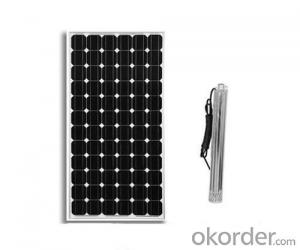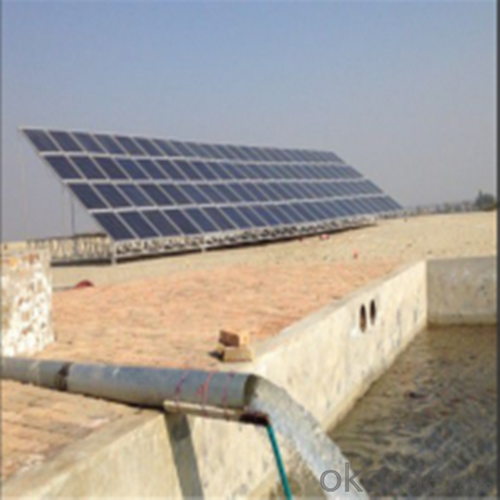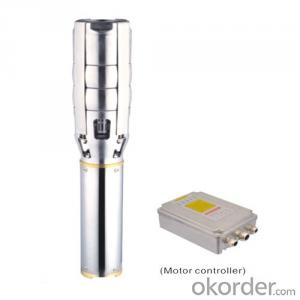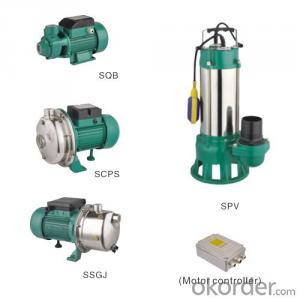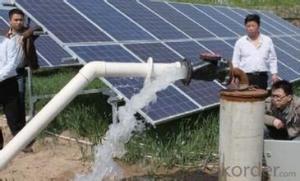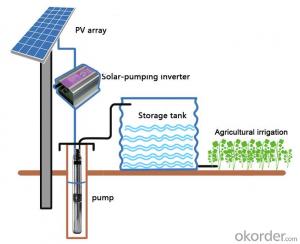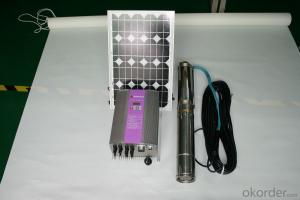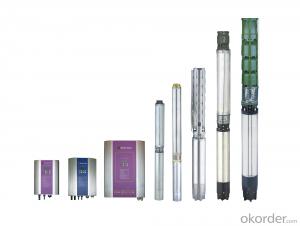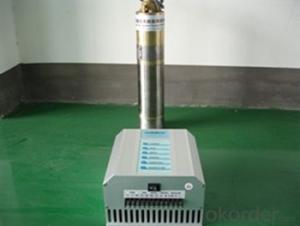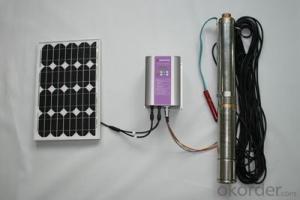Rainperfect Solar Pump Solar Water Panel for Irrigation
- Loading Port:
- Shanghai
- Payment Terms:
- TT OR LC
- Min Order Qty:
- 1 set
- Supply Capability:
- 1000 set/month
OKorder Service Pledge
OKorder Financial Service
You Might Also Like
Solar Water Panel Solar Pumps For Irrigation
DC solar water pumping system consists of the motor, pump, controller, solar array and some other accessories, such as water level sensor, float switch, etc. Considered that storing water is more efficient than storing electricity, the system is designed to directly drive the pump without battery which can reduce the construction and operating cost and routine maintenance effectively.The PV array consists of multiple solar panels connected in series/parallel, which can supply the whole system as power source by converting the absorbed solar radiation energy to the electrical energy. The pump driven by a brushless DC permanent magnet motor draws water from deep-well or river. The pumped water is then fed into reservoir or water tank, or connected to the irrigation system or fountain system directly.
Advanced Technology
Applications Innovation
The efficiency of DC brushless permanent magnet motor has been increased up to 25% in comparison with traditional asynchronous motor.
Technology Innovation
Stator and rotor are sealed by environment friendly casting resin.Motor insulation resistance can be hold higher than 300MΩfor more than 10 years, which consumedly increased the security and reliability of the submersible motor.
Structure Innovation
Casting resign technology processed stator and rotor as well as the water lubricated bearing make the submersible pump environment friendly.
Feature
High Efficiency & High Reliability
DC Brushless Permanent Magnet Motor
Minimum Maintenance, long Service Life
Environment Friendly Materials, Lubricated Without Oil
Application
Village or Family Water Supply
Animal Drinking Water & Livestock Watering
Garden/Courtyard Irrigation
Swimming Pool
Water Supply for Bivouac or Camping Car
Water Supply for Remote Area
Automatic Control
Operate Automatically, No Need Watching
Maximum Power Point Tracking (MPPT)
Dry-run Protection
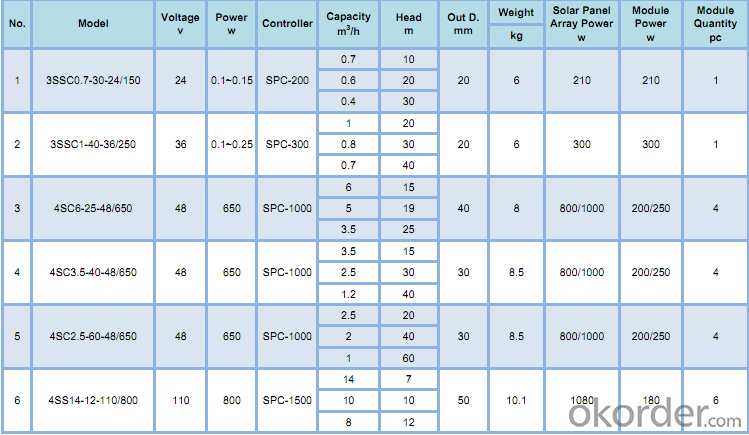
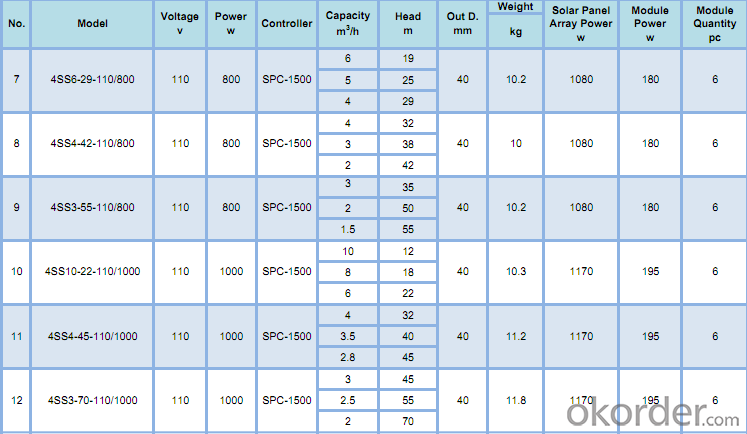
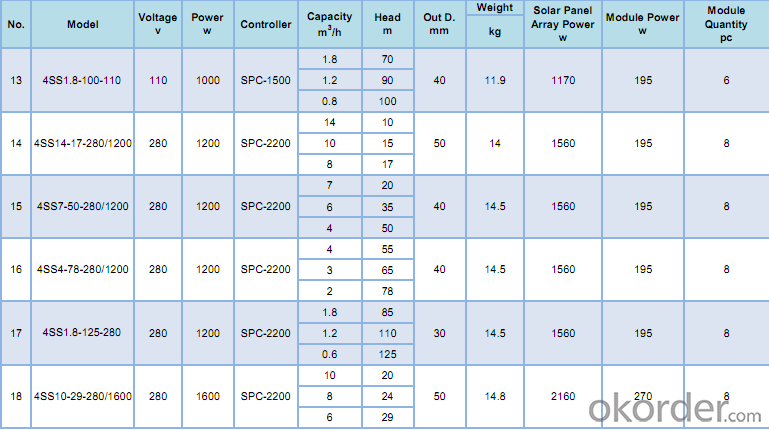
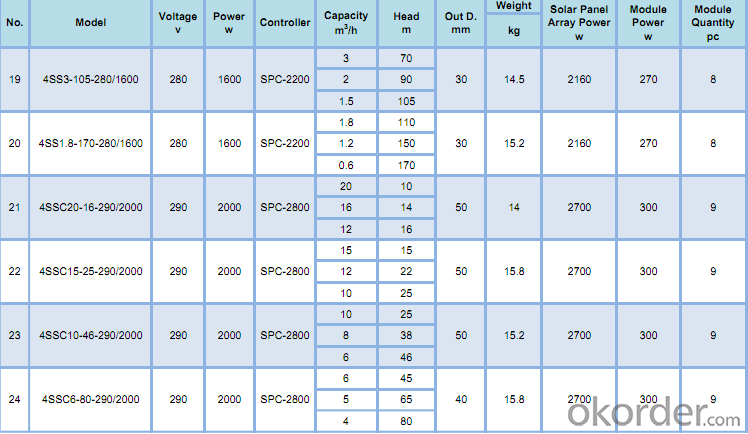
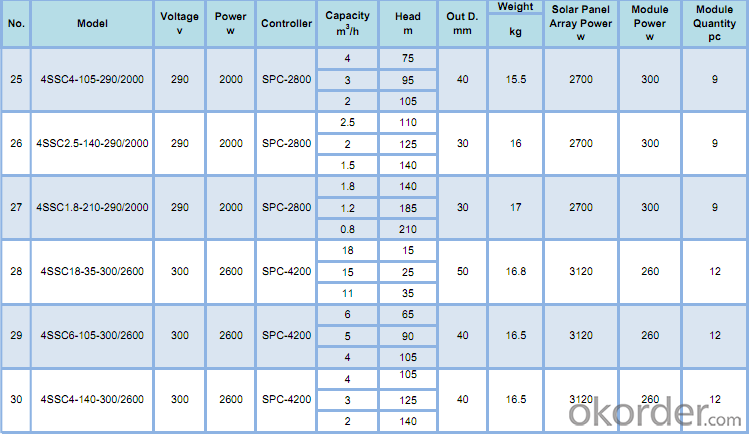
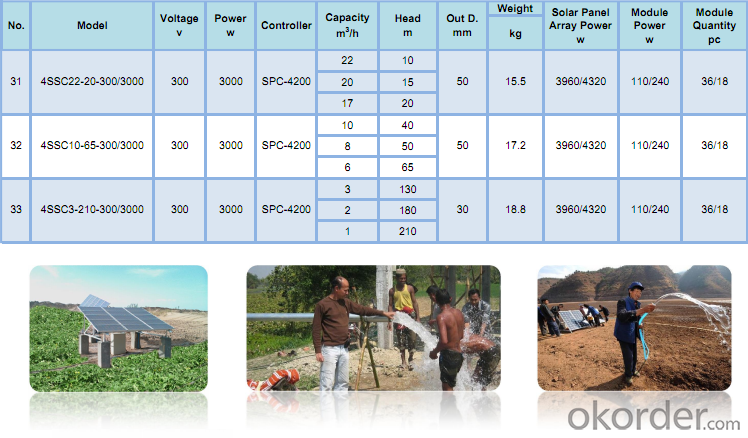
- Q: Can solar pumps be used in conjunction with rainwater harvesting systems?
- Yes, solar pumps can indeed be used in conjunction with rainwater harvesting systems. Solar pumps are a sustainable and cost-effective way to extract and distribute water, making them a perfect match for rainwater harvesting systems. The solar panels provide the necessary power to run the pump, allowing water to be efficiently pumped from the rainwater storage tanks for various uses such as irrigation or domestic needs. By combining solar pumps with rainwater harvesting systems, individuals can maximize water usage while minimizing dependence on traditional electricity sources.
- Q: How does a solar pump help in promoting sustainable development?
- A solar pump helps in promoting sustainable development by harnessing the sun's energy to power water pumps, eliminating the need for fossil fuels or electricity from the grid. This renewable energy source reduces carbon emissions and dependency on non-renewable resources, contributing to a cleaner and greener environment. Additionally, solar pumps provide access to clean and reliable water for irrigation, livestock, and domestic use in remote areas where electricity is scarce or unreliable. This, in turn, enhances agricultural productivity, food security, and economic opportunities, ultimately supporting sustainable development goals such as poverty reduction, improved health, and overall well-being.
- Q: Can a solar pump be used for water supply in off-grid farms?
- Yes, a solar pump can definitely be used for water supply in off-grid farms. Solar pumps are an excellent alternative to traditional fuel-powered pumps in remote areas where there is no access to electricity. They harness energy from the sun and convert it into power to pump water from a well or a water source to the desired location. Solar pumps have several advantages for off-grid farms. Firstly, they are cost-effective as they eliminate the need for fuel, reducing operational expenses in the long run. Additionally, solar pumps require minimal maintenance compared to fuel-powered pumps, which reduces downtime and increases productivity on the farm. They are also environmentally friendly, emitting zero greenhouse gas emissions and reducing the farm's carbon footprint. Moreover, solar pumps can be customized to suit different farm sizes and needs. They come in various sizes and power capacities to cater to small-scale farms as well as large agricultural operations. Solar pumps can efficiently pump water for irrigation, livestock watering, and other farm-related activities, ensuring a sustainable and reliable water supply even in remote areas. However, it is essential to consider certain factors when installing a solar pump for water supply in off-grid farms. The size of the solar panel and battery bank should be calculated based on the water demand and the available sunlight in the area. Additionally, proper installation and regular maintenance are crucial to ensure the optimal performance and longevity of the solar pump system. In conclusion, solar pumps are an excellent choice for water supply in off-grid farms. They offer a sustainable, cost-effective, and environmentally friendly solution, ensuring a reliable water source for irrigation and other farming activities.
- Q: Can solar pumps be used for water supply in refugee camps or temporary settlements?
- Yes, solar pumps can be effectively used for water supply in refugee camps or temporary settlements. Solar pumps are an ideal solution as they are environmentally friendly, cost-effective, and can operate in remote areas without access to electricity. They provide a sustainable and reliable source of water for drinking, sanitation, and other essential needs in these temporary settings.
- Q: What is the impact of a solar pump on wildlife conservation?
- The impact of a solar pump on wildlife conservation can be significant. By providing a sustainable source of water in remote areas, solar pumps can help create and restore habitats for various wildlife species. Access to clean water supports the survival and reproduction of animals, enabling them to thrive and maintain healthy populations. Additionally, solar pumps reduce the need for human intervention in traditional watering methods, minimizing disturbances to wildlife and their habitats. Overall, solar pumps contribute to the conservation of wildlife by promoting ecosystem balance and enhancing biodiversity.
- Q: Can solar pumps be used for water supply in remote hospitality or tourism facilities?
- Yes, solar pumps can be used for water supply in remote hospitality or tourism facilities. Solar pumps are an eco-friendly and sustainable solution for water supply in such locations as they utilize solar energy to pump water, eliminating the need for grid electricity or fossil fuels. They can provide a reliable and cost-effective water supply for remote facilities, ensuring a consistent and uninterrupted water source for guests and staff. Additionally, solar pumps require minimal maintenance and have a long lifespan, making them a practical choice for remote hospitality and tourism facilities.
- Q: Are there any limitations to using a solar pump?
- Yes, there are certain limitations to using a solar pump. One major limitation is that solar pumps are dependent on sunlight for their operation. This means that they may not be as effective or efficient during cloudy or rainy days, or in areas with limited sunlight. The amount of power generated by the solar panels directly affects the pump's performance, so if there is not enough sunlight, the pump may not be able to function optimally. Another limitation is the initial cost of installing a solar pump system. While solar pumps can save money in the long run by reducing electricity bills, the upfront costs can be significant. The cost includes not only the pump but also the solar panels, batteries, and other necessary components. This may make it less accessible for individuals or communities with limited financial resources. Additionally, solar pumps require adequate space for the installation of solar panels. The panels need to be positioned in a way that maximizes exposure to sunlight, which may require a large open area or a rooftop with unobstructed access to sunlight. In some urban or densely populated areas, finding suitable space for solar panels can be a challenge. Maintenance and repair can also be a limitation. Solar pumps require regular maintenance to ensure their efficient operation. This includes cleaning the solar panels, checking connections, and inspecting other components. If a part malfunctions or breaks, it may be more challenging to find specialized technicians or spare parts compared to conventional pumps. Lastly, the capacity of solar pumps can be limited. They may not be suitable for high-demand applications that require significant water flow or pressure. Larger-scale agricultural or industrial operations may require more powerful pumps that solar energy alone may not be able to provide. Despite these limitations, solar pumps offer numerous advantages such as energy efficiency, environmental friendliness, and long-term cost savings. It is important to carefully assess the specific requirements and limitations of your situation before deciding to use a solar pump.
- Q: Can a solar pump be used for pool heating?
- Yes, a solar pump can be used for pool heating. Solar pumps circulate water through solar panels, where it is heated by the sun's energy and then returned to the pool. This method of pool heating is efficient, environmentally friendly, and can help reduce energy costs.
- Q: Can solar pumps be integrated with existing water systems?
- Yes, solar pumps can be integrated with existing water systems. These pumps are designed to be compatible with different types of water systems and can be easily incorporated into the existing infrastructure. This integration allows for efficient and sustainable water supply without the need for traditional energy sources.
- Q: Are there any noise or vibration concerns with using a solar pump?
- No, there are generally no noise or vibration concerns with using a solar pump. Solar pumps are designed to operate silently and without any noticeable vibrations, making them an environmentally-friendly and quiet solution for pumping water.
Send your message to us
Rainperfect Solar Pump Solar Water Panel for Irrigation
- Loading Port:
- Shanghai
- Payment Terms:
- TT OR LC
- Min Order Qty:
- 1 set
- Supply Capability:
- 1000 set/month
OKorder Service Pledge
OKorder Financial Service
Similar products
Hot products
Hot Searches
Related keywords
